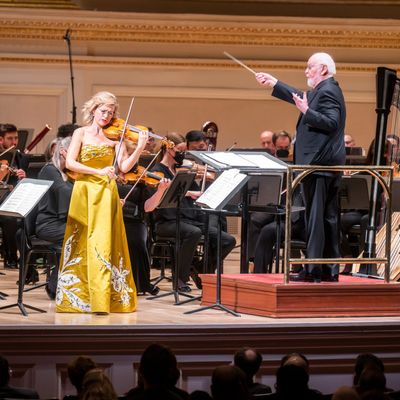
The king of American orchestral music arrived at Carnegie Hall, accompanied by his own Imperial March. John Williams, genial and limber at 90, conducted the Philadelphia Orchestra on Thursday night in two hours of the music that has infiltrated the world’s inner ear and shaped its visual imagination. Thanks to him, billions of us now know what it sounds like when bicycles take flight, sharks splinter small watercraft, archaeologists unearth magical artifacts, and dinosaurs go on a rampage.
All those dark brass choirs and swelling string themes evoke memories of Sibelius and Strauss and Mahler and Elgar and a whole catalogue of big-boned symphonies, but Williams’s eclecticism is endlessly inventive. He’s supplied the soundtrack for three generations of childhoods, from mine to that of the little girl who sat directly in front of me, clutching her plush snowy owl as “Hedwig’s Theme” from Harry Potter played. Among his more than 100 film scores are more than a few musical Mount Rushmores. It’s hard to grasp that some of those passages didn’t exist before they popped out of his brain.
Williams long ago reached an age where he could have spent his time smiling benevolently through tribute events. Instead, he’s still meeting deadlines and cranking out scores (including for Steven Spielberg’s The Fabelmans, due out next fall). He seemingly had a few weeks of unexpected leisure during the heart of the pandemic, because that’s when he tossed off a new violin concerto. He and Anne-Sophie Mutter have already recorded it (the second movement is out), and on Thursday they gave the New York premiere of this long and uncharacteristically meandering work, which is full of charms and beautiful moments that don’t quite gel. The easy explanation would be that a lifetime of thinking in two-minute cues doesn’t help with the long spans of a concert. Or that a film composer of his gifts needs a cinematic stimulus to do his best work. Both are possible; I prefer to think that he’s written mountains of fine music, but nobody bats 1,000.
Mutter put in a strenuous night’s work, too, twirling through the high-speed swordsmanship of a duel scene, tracking Hedwig in bewitching flight, and, in an encore, unspooling the vividly tragic theme from Schindler’s List. There was one surprise, from the gritty 1973 film Cinderella Liberty, which features James Caan as a sailor on leave and Marsha Mason as a sex worker and single mom. Tintin it’s not. In the original incarnation, the score has a jazzy, low-down, wet-streets-at-night feel and a harmonica solo played by Toots Thielemans. Now, Williams has given it a fresh coat of varnish and a new orchestration for violin and orchestra. In Mutter’s hands it sounded positively Viennese — airy, melancholy, and elegant, like a scene illuminated by gaslight rather than neon. Those few minutes made me wish someone would make a new movie to accompany that old score.





